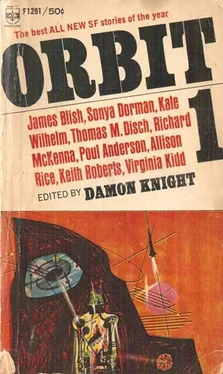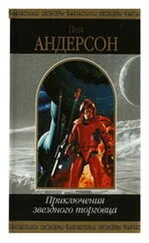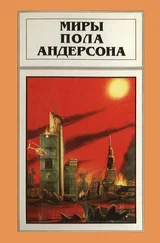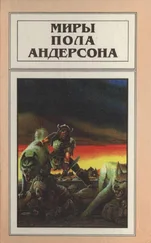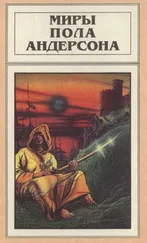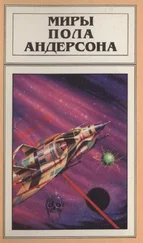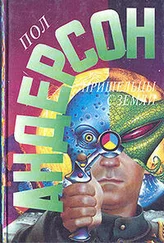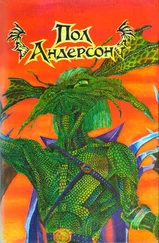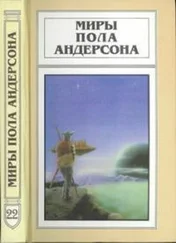Пол Андерсон - Orbit 1
Здесь есть возможность читать онлайн «Пол Андерсон - Orbit 1» весь текст электронной книги совершенно бесплатно (целиком полную версию без сокращений). В некоторых случаях можно слушать аудио, скачать через торрент в формате fb2 и присутствует краткое содержание. Год выпуска: 1966, Жанр: Фантастика и фэнтези, на английском языке. Описание произведения, (предисловие) а так же отзывы посетителей доступны на портале библиотеки ЛибКат.
- Название:Orbit 1
- Автор:
- Жанр:
- Год:1966
- ISBN:нет данных
- Рейтинг книги:4 / 5. Голосов: 1
-
Избранное:Добавить в избранное
- Отзывы:
-
Ваша оценка:
- 80
- 1
- 2
- 3
- 4
- 5
Orbit 1: краткое содержание, описание и аннотация
Предлагаем к чтению аннотацию, описание, краткое содержание или предисловие (зависит от того, что написал сам автор книги «Orbit 1»). Если вы не нашли необходимую информацию о книге — напишите в комментариях, мы постараемся отыскать её.
Orbit 1 — читать онлайн бесплатно полную книгу (весь текст) целиком
Ниже представлен текст книги, разбитый по страницам. Система сохранения места последней прочитанной страницы, позволяет с удобством читать онлайн бесплатно книгу «Orbit 1», без необходимости каждый раз заново искать на чём Вы остановились. Поставьте закладку, и сможете в любой момент перейти на страницу, на которой закончили чтение.
Интервал:
Закладка:
“Oh, to hell with it,” she said, lying down. From time to time she lifted her lids cautiously, and each time opened them further, kept them open longer. For hours she practiced, right on through the spinach and lime sherbet. When the nurse came in, she asked, “May I have a mirror?”
“We don’t keep them in the rooms, dear. When you’re able to walk, you can find one in the bathroom.”
“But how do I look?” she asked.
The nurse stood staring seriously at her. “Not badly,” the nurse assured her. “Your eye is clouded with scar tissue, but that will be removed later.”
She groaned. “It looks lousy, I knew it. Thanks anyway.”
The nurse continued to view her sternly, until she said, “It’s all right, nurse.”
“There’s a good girl,” the nurse said. “Lie down for a bit and rest.”
The nurse went out to the doctor, who was across the corridor standing in the doorway of a huge classroom, talking with two visitors. The nurse said to him, “Shall we discontinue Miss D.’s cycle?”
“Yes, but only for two days. We have a new class of opthalmologists already waiting.” Then he turned courteously to the visitors.
“Her circuit has now been fully rerun,” the doctor explained to them. “After two days, it will be run again.”
One of the visitors asked, “But how do you start it at the beginning?”
The doctor looked surprised. “Oh, but we reproduce the original wound, or damage, of course.”
The other visitor asked, “Are they never conscious? I mean are they never aware, at some point, of rerunning?”
“Certainly not,” the doctor said in a shocked voice.
“How do you replace them?”
The doctor put his hands in his pockets, and began to lead the visitors down the corridor toward another room. “This floor is always full,” he explained. “Accident cases who remain unidentified, or who have no relatives, or, for the most part, who have no money and can’t pay hospital bills.”
The nurse passed them and went into the patient’s room with a tray on which stood a little paper cup with pills in it.
“More pills?” she asked.
“Now, Miss D., we’re doing so well. Don’t you want to go home? To be all finished up here?”
She began to murmur, “All finished, all washed up, all done for,” while the nurse put the pill into her mouth, and gave her a glass of water.
“Yes, yes, home to Mom, all finished up, home to the dial-a-slice, mmmm,” as the drowsy waves came washing over her.
“Take another sip,” the nurse said, pressing the glass against her lower lip.
She gulped twice, once for the pill, then for the water. “Mmmm. Take me home, carry me back, my eye’s all filled in, not a penny in the socket, I’ll be asleep soon.”
“This won’t hurt,” the doctor said, leaning over her. She saw his white sleeve cross her face toward her right eye, and then he plunged the hypodermic through the lower lid and the eyeball and she let out a scream. The attending class of young students in the auditorium shuddered, and leaned forward for a better view.
“Look up,” the doctor commanded. “You must look up.”
I will look up unto the hills, she said fiercely, promising not to scream again. She looked up, out, over the plastic cage of the hypodermic, to the range of hills covered with crackling snow. They were all there, all the people, they must be out for a winter picnic. I will go, she promised.
“I’ll get up and go,” she yelled.
The doctor murmured, “All right, all right. Track’s wearing out, I knew it would,” and then raising his voice slightly, as he continued to probe in the depths of her eye, he said to her, “Yes, you’ll go, you’ll get a splendid vacation.”
“But I want to take my eye with me,” she insisted. “I must, I need it.”
“Hush, now, tch,” the nurse said soothingly.
“You’ll take your eye,” the doctor promised her. “Hold still, now. We’ll finish soon,” but there was despair in his voice, and she did not believe him. Obviously she had lost the eye, and what else had she lost? She did not dare to move her head, but under the cold, sterile sheet that covered her, she clasped her wrinkled hands.
THOMAS M. DISCH is an ebullient young man who has done time on Madison Avenue, in ballet, little theater and grand opera. His first novel, The Genocides, was published by Berkley this year. When last heard from, he was in Europe writing two more.
5 EGGS
By Thomas M. Disch
Alas, he thought (and that was exactly how he did think, with words like that), alas, Nyctimene has flown from me. From their very first evening on the hill, beneath the great oak, he had known this could happen, but he had denied it with all the steely force of his will — and now that steel was molten with grief. Nyctimene had gone, she would never come back.
She had been more beautiful than he had believed possible: not the exotic beauty of a gull or a flamingo, which must, in its nature, fly away; not tentative like the rustle of branches and the brief sighting through the summer foliage of a white breast or wingtip, which vanishes. It had been an amazement of beauty. Her face poised over his, her cruel loving lips parted in a smile that mocked their own mortality, her eyes. His rapture— their rapture — had been compounded by the knowledge they shared of its brevity.
Before Nyctimene he would not have thought it possible for himself to be so carried away. Love, she had taught him, was Jove — a giant swan, showers of gold, a stampede.
Remorse? No, that was an amenity — for afterward, when the stampede was over. Remorse was for now.
Now (or in half an hour, at seven o’clock) he might be exquisitely remorseful. At seven, such friends as still remained to him would arrive to offer their congratulations on his announced engagement to Nyctimene. How would he tell them that she had gone? Should he pretend simply to be embarrassed, as though he had invited them to a garden party that had been rained out? Was it even possible to conceal his grief? Probably he would get drunk. Of the courses open to him that seemed the least distasteful.
In the morning he had gone into town for groceries for the party, run the provincial gauntlet of snubs and whispers (most of the townspeople had pretensions to honoring the institution of marriage and felt compelled therefore to show their disapproval of so open a liaison as his and Nyctimene’s), and returned to find her note:
Dearest,
We knew didn’t we? But when I tried to mention it, when we would lie in the meadow looking at the stars, the wonderful stars, or once when we kissed and you mentioned the hardness in the middle of my upper lip and touched your finger to the small “bone” there, I would begin to tell you. But you knew already and prevented me.
I will always remember that your eyes were blue, your strangeness, your words (many that I never understood), your caresses. I have loved you, but now I must go.
It has only been two months! So quickly.
I never believed in that word of yours— inevitable. I understand, at last, what you meant by it. You meant that for yourself it was inevitable that I would leave. It is a funny idea and it makes me smile. Perhaps you would think I’m crying. Did you know that it is not possible, physically, for me to cry?
The eggs that I am leaving in the basket will hatch in thirty of your days. Keep them at room temperature—70°.
I laughed so hard at that funny play you read to me — not Titus Andronicus (though that was funny too) but the other one — that you will be surprised that I have remembered a line from it:
Good night, good night! Parting is such sweet sorrow
Читать дальшеИнтервал:
Закладка:
Похожие книги на «Orbit 1»
Представляем Вашему вниманию похожие книги на «Orbit 1» списком для выбора. Мы отобрали схожую по названию и смыслу литературу в надежде предоставить читателям больше вариантов отыскать новые, интересные, ещё непрочитанные произведения.
Обсуждение, отзывы о книге «Orbit 1» и просто собственные мнения читателей. Оставьте ваши комментарии, напишите, что Вы думаете о произведении, его смысле или главных героях. Укажите что конкретно понравилось, а что нет, и почему Вы так считаете.
